World
European elections: Centre left struggles to hold back surge from right
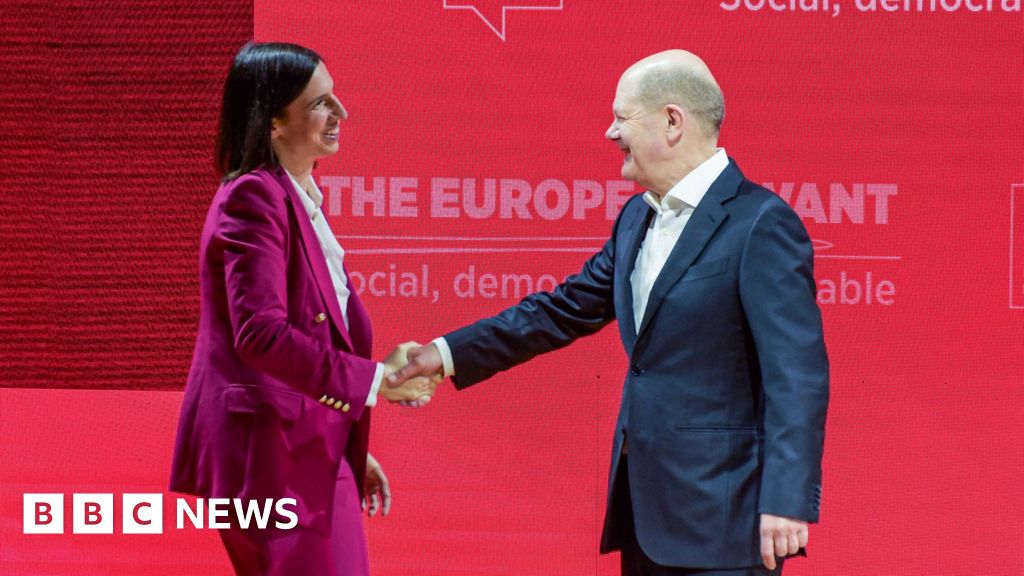
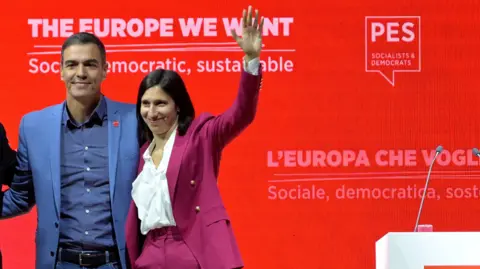 Andreas SOLARO/AFP
Andreas SOLARO/AFP“The very soul of Europe is at risk,” Spanish Prime Minister Pedro Sánchez warned fellow European centre-left politicians who had gathered in Rome ahead of a difficult EU election campaign.
At stake was how to halt the seemingly unstoppable rise of right-wing and far-right parties in the European Parliament vote, which starts on Thursday in the Netherlands and continues across all 27 EU member states until Sunday.
Only four EU member states have centre-left or left-wing parties in government and recent performances at the ballot box have been poor. The omens for the coming days are not good.
The European left is in “bad health”, says Prof Marc Lazar of Sciences Po in Paris and Rome’s Luiss University, the result of a steady decline that began in the late 1990s and early 2000s.
The EU’s centre left makes up the second largest group in the outgoing European Parliament. Known as the Progressive Alliance of Socialists and Democrats (S&D), they are projected, at best, to cling on to their 139 seats in the 720-seat parliament.
It is Europe’s parties on the right that have the wind in their sails, and any success the centre left achieves is likely be offset by losses elsewhere.
In only four countries are the Socialists and Democrats projected to come out on top – in Sweden, Denmark, Lithuania and Malta. Even then, Denmark’s Social Democrats under Prime Minister Mette Frederiksen are geared up for a big drop in support.
Hers is one of only four out of 27 member states with centre-left or left-wing parties at the helm. Spain, Germany, and Malta are the others.
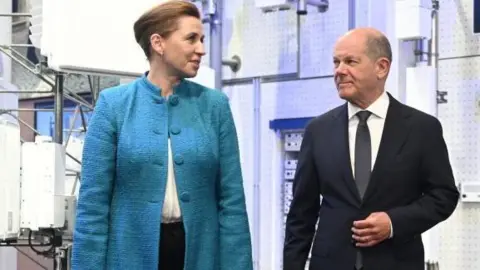 Pontus LUNDAHL/TT NEWS AGENCY/AFP
Pontus LUNDAHL/TT NEWS AGENCY/AFPSpain’s Socialists under Pedro Sánchez and German Chancellor Olaf Scholz’s Social Democrats are set to be leapfrogged by their conservative opponents – the Christian Democrats in Germany and the Popular Party (PP) in Spain.
Mr Scholz’s party has been steadily losing support since it won the 2021 federal elections and it is now in a battle for second place with the far-right AfD party.
Pedro Sánchez is in a better position because of a controversial amnesty deal he struck with pro-independence Catalan parties. But that has also opened him up to criticism from the PP and far-right Vox.
For some opposition parties on the left the situation could end up far worse, as they face being overtaken by the far right.
Pawel Zerka, senior policy fellow at the European Council on Foreign Relations, says centre-left parties have shifted in recent years away from traditional socialist ideas towards more liberal policies, so they are now “too similar” to the centre right, who are “equally pro-European, with similar positions on economic policies and climate”.
Latest surveys suggest most Europeans consider poverty, public health, the economy and the EU’s defence and security among their top concerns.
And while the S&D’s manifesto promises to address these very issues, Prof Marc Lazar says for many voters it is too late, because the left failed to protect them when they had the chance.
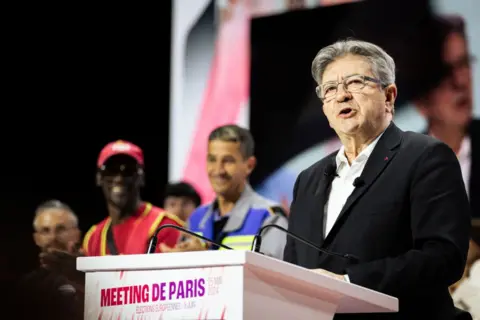 Telmo Pinto/NurPhoto
Telmo Pinto/NurPhoto As the left moved to the centre on socio-economic battles, the right and far right grew in strength, says Pawel Zerka. Cordons aimed at keeping the more extreme parties at bay then cemented the perception that they, rather than the left, were the real opposition to the centre.
The left then started to champion issues like gender, LGBT rights or green policies: popular with urban young voters, less so with working-class families.
“In many European countries the centre left is now seen as the rich progressive elite of the cities,” argues Mr Zerka.
Some parties on the left have taken note, combining progressive and conservative policies.
Denmark’s Social Democrats have taken a tough stance on migration, while Romania’s Social Democrats mix conservative values and Eurosceptic tendencies with centre-left economic policies.
Migration has shaped and defined the European political debate over the past decade and many “old left” voters have looked elsewhere for solutions.
France’s National Rally, under Marine Le Pen and Jordan Bardella, has been more successful than most in attracting voters with its anti-migration platform. The RN is well ahead of any of its rivals in this election.
A French study carried out shortly after France’s 2022 elections showed that 42% of working-class men and women cast their vote for Marine Le Pen. One RN mayor said the left “forgot its fundamental principles when it supported minorities rather than workers – while we defended them”.
Across the Alps, the Italian Democratic Party (PD) has struggled to find a coherent line to counter the anti-immigrant message of Giorgia Meloni’s far-right Brothers of Italy (FdI). It remains internally fragmented and in opposition, but should come second to FdI in these elections.
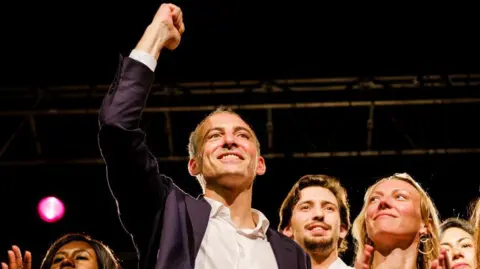 DAVID COSTA/AFP
DAVID COSTA/AFPIt is not all bad news for the left.
France’s Socialists have a new champion in Raphaël Glucksmann, who has emerged as a moderate, pro-European leader out of the collapse of an alliance of left-wing parties in French elections two years ago.
Moderates have long felt alienated by anti-capitalist Eurosceptic Jean-Luc Mélenchon, who for years has been the most prominent figure of the French left.
An MEP since 2019, Mr Glucksmann has no hope of catching Jordan Bardella’s National Rally, but he is challenging for second place with the centrist Renew list backed by President Emmanuel Macron.
Sweden’s Social Democratic Party is set to obtain 30% of the vote in June, and remains the largest party in Sweden, even though a centre-right coalition is in government.
But these are slim pickings for a movement that once dominated the European scene.
In the past 10 years the EU has gone through events that had the potential to strengthen the traditionally pro-European left – from Covid-19 to the war in Ukraine and the fight against climate change – once the importance of a joint European response became clear.
So too, the current cost of living crisis could have been an opportunity for left-wing politicians to argue for stronger welfare measures.
Part of the problem could be down to today’s leaders, commentators believe.
Olaf Scholz has faced accusations of dithering on Ukraine, while the head of Italy’s centre left, Elly Schlein, has been criticised for being too divisive.
“For a long time now, we haven’t seen great left-wing leaders like Tony Blair, Gerhard Schröder or François Mitterrand,” argues Prof Lazar. “Now, when we think of leadership in Europe, we think of [Hungary’s Viktor] Orban, [Italy’s Giorgia] Meloni, [France’s Marine] Le Pen.”
That is why Raphaël Glucksmann in France has attracted so much interest from voters in a relatively short time, and why he’s promising supporters to be the “great, big surprise” of this election.








:max_bytes(150000):strip_icc()/roundup-writereditor-loved-deals-tout-f5de51f85de145b2b1eb99cdb7b6cb84.jpg)


